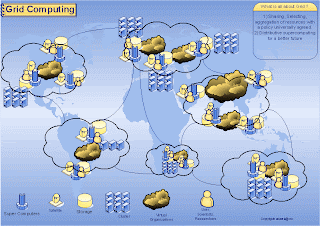Grid computing
Wednesday, 5 December 2012
Advantages of Grid
Computing
Idle resources can be
efficiently handled by the use of Grid Computing.
Large, complex
problems can be solved in a short span of time.
Easier to team up
with other organizations.
Grid environments are
modular and they do not fail due do the error that occurs at one particular
point. Jobs can
be restarted automatically when there is a failure.
Jobs can be done in parallel thus
resulting in faster execution.
Disadvantages of Grid
Computing
Need a fast
interconnection between the computer resources.
A few applications
may need to be altered to take full advantage of the new model.
Many groups do not
wish to share resources even if it benefits everybody.
Jobs submitted may be
non-interactive thus leading to chaos.
Grid computing
standards and grid software are still in developing state.
Grid can be imagined
to be a distributed environment with heterogeneous systems that consist of
enormous data files. The dimensions of a grid are not always the same.
Moreover, one single grid can be used for several purposes. Grid computing can
be easily distinguished from other traditional systems such as cluster
computing in such a way that a grid is more loosely coupled, is heterogeneous
and widespread.
Grid computing can
also be referred as ‘Distributed Computing’. It is a Parallel Computing
technique that depends on computer systems linked to a network through
traditional network interfaces. This is in contradiction to a Supercomputer in
which a number of processors are connected by a local
high speed computer bus.
CPU Scavenging leads
to the creation of a grid by taking the dormant resources present in a computer
network. CPU Scavenging uses the instruction cycles of a desktop computer which
would have been wasted by just waiting for an input from the user or from an
input device.
What is grid computing ?
Grid Computing is the process of distributing tasks over
a wide range of computers. These tasks can vary from very small data storage to
highly complicated calculations. Grid computing is not restricted to one
particular locality but can be extended over vast geographical areas. Grid
computing can also be referred to as the .integration of computer resources to
accomplish a common goal
Subscribe to:
Comments (Atom)






